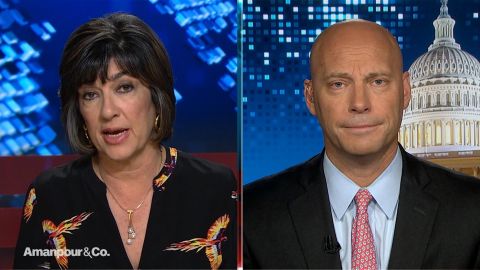Read Transcript EXPAND
WARNER: I think for years we celebrated the great success of these tech companies and they are remarkably successful. But as we have seen over the last few years in major way starting with the Russian intervention into our elections in 2016, we have seen the ability to manipulate and misuse social media. Russians did it fabulously well by creating hundreds and hundreds of fake accounts that touched literally hundreds of millions of Americans. So, I laid out what I believe is one of the most extensive white papers, laying out over 20 ideas on how we might think of some of these guard rails, and let me briefly, not touch on all 20 but touch in three areas where I think some debate and somewhat sense of regulation may take place. First is around privacy. And Europe, as you’re aware, Christiane, has already set up a set of regulations called GDPR. It’s a little bit clunky in certain ways but has set privacy regulations. Much of those regulations have actually been copied by California with their own state legislative activities, part of that will allow you to have better transparency into the data that this company collect on you, the ability to be forgotten, the ability to take down some of that data. But there’s a whole series of ideas around privacy. That’s bucket number one. Bucket number two, it’s not received as much attention, but I think it’s where a lot of the debate will be — is moving is around identity validation over the internet. In many ways, the internet was created as this vast open square where you could appear anonymously and many times these hate groups are — people are not representing themselves with the real names but they’re appearing anonymously and spreading this kind of venom and frankly, finding ability to connect with similar kind of hateful views in ways that are fairly spectacular. So, certain ideas that I have laid out, for example, should we, when we go in the internet, have the right to know when we’re being contacted, whether we’re being contacted by a human being or a bot, a fellow computer? Now, there’s nothing inherently wrong with being communicated by with a computer but should you have the right to know that as you receive these messages? Should you have the right to know if someone says they’re, Christiane, posting in New York but this post is actually originating in St. Petersburg, Russia? Should there be a geo indicator that pops up and says somebody is representing themselves to be one place but they’re actually — this post is originating someplace else? And there are even some that are starting to say that there needs to be perhaps even two internets going forward. One where you can be anonymous but another internet where if you’re going to transact business, you have to have identity validation.
About This Episode EXPAND
Christiane Amanpour speaks with U.S. Senator Mark Warner about new theories about what happened to Jamal Khashoggi and former White House Director of Legislative Affairs Marc Short about President Trump’s pre-midterm rhetoric. Walter Isaacson speaks with U.S. Representative Garret Graves about cross-party cooperation.
LEARN MORE


